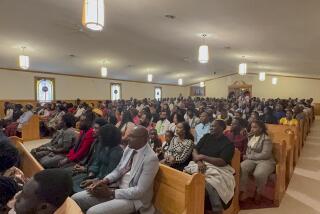John H. Cross Jr., 82; led Alabama church during violent era
- Share via
The Rev. John H. Cross Jr., who was pastor of the 16th Street Baptist Church in Birmingham, Ala., in 1963, when four girls at his church were killed in a bombing that became a turning point in the civil rights movement, died Thursday at a hospital in Lithonia, Ga. He was 82 and had had a series of strokes in recent years.
Cross was named pastor of the venerable Birmingham church in 1962 after serving at a Baptist church in Richmond, Va. Not previously identified as a civil rights activist, he appeared to be a good match for the conservative black church with its well-educated congregation.
But when he stepped off the train in Birmingham and tried to hail a taxicab, Cross encountered a level of racial animosity he hadn’t seen anywhere else.
I “don’t drive coloreds,” a white taxi driver told him, according to a 1991 article in the Boston Globe.
“I’ll tell you what,” Cross said, leaning in the window. “I’m coming here to pastor a church. Before I leave here, you’ll be hauling anybody who wants to be hauled.”
Encouraged by the Rev. Martin Luther King Jr., Cross made his church a rallying point for the civil rights movement in one of the most volatile cities in the South. Birmingham had a strong Ku Klux Klan presence and had been shaken for years by insidious, random violence. The city’s public safety commissioner, Eugene “Bull” Connor, was notorious for unleashing dogs and turning high-powered fire hoses on demonstrators. Many protesters were beaten in clashes with police.
On Sunday, Sept. 15, 1963, Cross was at the church, preparing to deliver a sermon called “A Rock That Will Not Roll” for a youth worship service. At 10:22 a.m., an explosion shattered the morning calm, crumbling a brick wall and destroying the face of Jesus in a stained-glass window.
At first, Cross thought the church’s water heater had exploded, but he could smell the powder of explosives and hear anguished cries amid clouds of dust and smoke. As he and church members dug through rubble in the collapsed basement, he found the bodies of 11-year-old Denise McNair and Addie Mae Collins, Carole Robertson and Cynthia Wesley, all 14.
“They were all stacked in a pile, like they clung together,” Cross recalled in 2001. “Their bodies were so mutilated I couldn’t recognize any one of them, as well as I knew these girls. It was like looking at strangers.”
As word of the bombing spread, more than 2,000 people gathered at the church, and some began to throw stones and concrete at passing cars with white drivers. Cross stopped one woman from hurling a brick.
“I had to reach up and touch her hand,” he said. “I said, ‘No, you can’t settle it like this.’ ”
Sobbing, he picked up a bullhorn to address the crowd and began to recite the 23rd Psalm.
The church bombing was the 21st in Birmingham since 1955, and the fourth in four weeks, but it was the first to claim lives. Twenty-two people were injured.
The resulting national uproar galvanized the civil rights movement, as people of all races united in outrage. Cross officiated at a funeral for three of the girls killed at his church. King gave the eulogy at the service, which was attended by 8,000 people.
In October 1963, Robert E. Chambliss, a member of a Klan splinter group, was fined $100 and sentenced to six months in jail for possessing dynamite, but he was acquitted of murder charges. Fourteen years later, he was tried again for the bombing and sentenced to life in prison. He died in 1985.
The case was reopened in 1997, when it was revealed that thousands of FBI documents had been kept from prosecutors. One suspect, Herman Cash, had died in 1994. Two others, Thomas Blanton Jr. and Bobby Frank Cherry, were convicted in 2001 and 2002, respectively, for their roles in the bombing plot and received life sentences. Cherry died in prison in 2004.
Cross testified at Blanton’s trial in 2001.
Cross was born Jan. 27, 1925, in Haynes, Ark. He served as an assistant chaplain in an Army unit immediately after high school. He graduated from Virginia Union University in Richmond, and later earned a master’s of divinity degree from that school.
He left Birmingham in 1968 to teach at Alabama State University and to direct a Baptist student center. After serving as associate pastor of a church in Decatur, Ga., from 1972 to 1977, he became an official with the Atlanta Baptist Assn. He retired in 1989 but continued to work for several years as a part-time minister and youth counselor.
Throughout his life, he was haunted by the epochal events in Birmingham in 1963. “Hardly a day passes I don’t think about it -- dream about it two or three times a week,” he said.
His wife died in 2003. Survivors include his four children.
More to Read
Sign up for Essential California
The most important California stories and recommendations in your inbox every morning.
You may occasionally receive promotional content from the Los Angeles Times.










